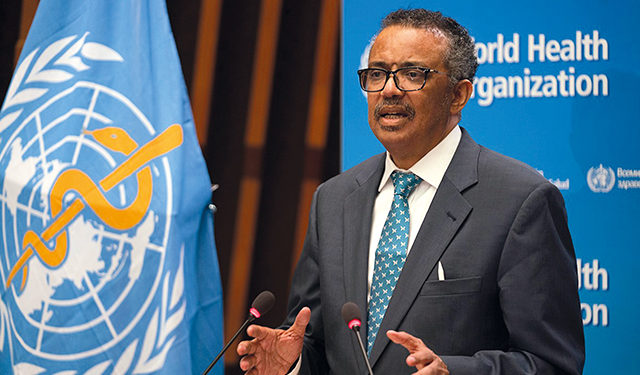According to the NY Times, Georgia still ranks first in the world in terms of the spread of coronavirus.
Based on its data which was taken from Our World in Data statistics, there has been a 155% increase in coronavirus cases in Georgia during the past 14 days, with an average of 112 cases per 100,000 people, which is the highest number worldwide.
Georgia is followed by Latvia, Barbados, Serbia and the United Kingdom’s Isle of Man.
According to the same data, since the beginning of the pandemic, every 6th person in Georgia has been infected with the coronavirus.
The COVID situation in Georgia is indeed very concerning. Head of the National Center for Disease Control, Amiran Gamkrelidze, confirmed this week that the “fifth wave” had started, and from a higher point than expected.
“Unfortunately, a rather difficult epidemic situation is developing. The number of daily cases has been exceeding 4000, which indicates that the infection is spreading quickly and easily. Unfortunately, the epidemic situation in the country is continuing to deteriorate,” Gamkrelidze said.
He noted that it is important to follow the recommendations – wearing a face mask and observing social distance. It is also considered vital to vaccinate as many citizens as possible, otherwise, the issue of tightening regulations may become a necessity.
“If we do not carry out the vaccination process, then it will be a difficult November and the country will have to impose restrictive measures again,” Gamkrelidze told media, adding that an increase in vaccinations could save up to 2000 lives before the New Year.
“We need to realize that vaccination protects us from infection, hospitalization and mortality. Every citizen should understand that we get vaccinated to protect ourselves, our families, our friends, and each other,” Gamkrelidze said.
However, despite a number of such calls, the vaccination rate in the country remains low, with up to maximum 5000 vaccinations per day. 32% of the adult population has been vaccinated so far, which is not enough, Gamkrelidze said, noting that the NCDC will prepare incentive measures next Tuesday for increasing vaccine uptake.
In contrast came a slightly more optimistic message from Minister of Health, Ekaterine Tikaradze.
She said that the vaccination marathon is ongoing in Kakheti, and noted that locals say the delay in the vaccination process was largely due to the harvest.
“It is important for the local self-government in each region to be actively involved in this process, because the central government alone will not be able to conduct this process effectively. Of course, this does not mean that the central government is relieved of responsibility,” Tikaradze said.
She also noted this is not only Georgia’s problem. In countries like the United States, after reaching a certain threshold, they too face issues trying to convince citizens who are resistant to the vaccination process to get vaccinated.
“We, of course, share international practice and are gradually planning incentives and information campaigns that will be effective to encourage vaccination,” she announced.
She agreed there is a decrease in the vaccination process, which she says was expected due to the fact that they have already reached 40% of the population.
“We have certain rankings, with Tbilisi, Adjara, and several Imereti municipalities leading. In other municipalities we do not have benchmarks as in Tbilisi and Adjara, where up to 70% are vaccinated with two doses,” Tikaradze said.
She announced they will use all the tools they can to encourage the vaccination process, and there is an expectation that the situation in the country “will be much better in November.”
To date, 150 schools and 400 classes have switched to online learning due to the virus.
Given such a difficult epidemiological situation, health and government officials do not exclude imposing new tough restrictions, however, exactly what kind of restrictions will be imposed, or whether curfew will be reintroduced, is unknown at this stage.
“Since the Covid-19 projections are not reliable, the Coordination Council may have to make some tough decisions to prevent the spread of the virus,” the NCDC’s Gamkrelidze announced.
The Statistics
Georgia reported 5739 coronavirus cases, 2082 recoveries, and 36 deaths on Tuesday, as a result of 56,555 tests taken. Georgian capital Tbilisi recorded the highest number of 1862 Covid-19 cases, followed by the Imereti region with 1151 cases, and the Kakheti region with 912 cases.
Georgia reported 5219 coronavirus cases, 2348 recoveries, and 42 deaths on Wednesday, with 57,301 tests conducted. The testing revealed that Tbilisi again recorded the highest number of 1775 Covid-19 cases within 24 hours, followed by the Imereti and Kakheti regions, each with 907 cases.
On Thursday, 4411 new cases of coronavirus were registered in Georgia, 29 people died, and 2896 people recovered.
A total of 680,182 cases of coronavirus have been confirmed in Georgia since February 2020, of which 607,563 have recovered and 9370 have died.
Thursday’s cases saw 1456 cases confirmed in Tbilisi, in Adjara – 111, Imereti – 827, Kvemo Kartli – 293, Shida Kartli – 347, Guria – 93, Samegrelo – Zemo Svaneti – 348, Kakheti – 696, Mtskheta-Mtianeti – 104, Samtskhe-Javakheti – 88 , Racha-Lechkhumi and Kvemo Svaneti – 48.
1,895.771 people have been fully vaccinated in Georgia so far.
The Cases Worldwide
One billion COVID-19 vaccine doses have been administered in the WHO European Region. But risks for the unvaccinated leave no room for complacency, the WHO says.
In a statement Wednesday, WHO’s Europe office said 1 billion coronavirus vaccines have now been administered across the continent, and described uneven vaccine uptake as “the region’s biggest enemy in the fight against COVID-19.”
The urgency to accelerate vaccinations is therefore crystal clear, the WHO says. The vast majority of people who are hospitalized due to COVID-19 and require critical care have not received their full course of COVID-19 vaccine, it adds.
“COVID-19 vaccines have been developed to save lives, not to eliminate SARS-CoV-2 and halt its transmission. Yet, the more people who get vaccinated, the easier it is to bring transmission under control. Reaching 70% coverage everywhere is still our goal if we wish to stabilize the crisis,” the organization noted.
The World Health Organization noted there was a 7% rise in new coronavirus cases across Europe last week, the only region in the world where cases increased.
The two regions with the highest rates of COVID-19 incidence were Europe and the Americas. Globally, the US reported the biggest number of new cases, more than 580,000, which still represented a 11% decline.
Britain, Russia and Turkey accounted for the most cases in Europe.
“The biggest drop in COVID-19 cases were seen in Africa and the Western Pacific, where infections fell by about 18% and 16%, respectively. The number of deaths in Africa also declined by about a quarter, despite the dire shortage of vaccines on the continent,” reports ABC News.
But for the third consecutive week, coronavirus cases have jumped in Europe, with about 1.3 million new cases. More than half of countries in the region reported a rise in their COVID-19 numbers, WHO said. Britain and Russia each reported about a 15% increase in new cases.
In the past week, Russia has repeatedly broken new daily records for COVID-19 cases and the number of infections in the UK has surged to levels not seen since mid-July.
Russian President Vladimir Putin on Wednesday backed a Cabinet proposal to keep Russian workers home for a week in an effort to stem the spread of the virus.
“Although the head of Britain’s National Health Service has urged the government to introduce stricter COVID-19 protocols including mask-wearing and the faster vaccination of children, politicians have so far demurred,” reports the foreign media.
By Ana Dumbadze














